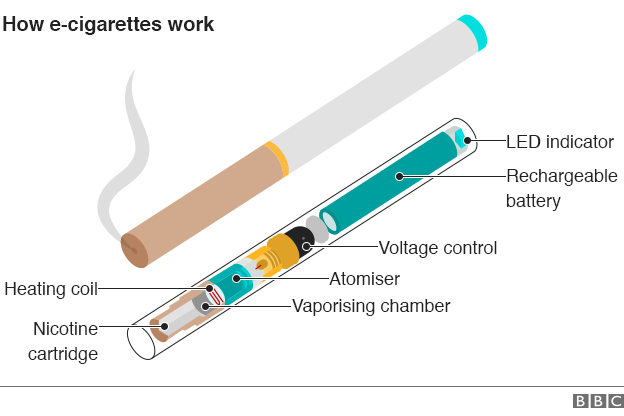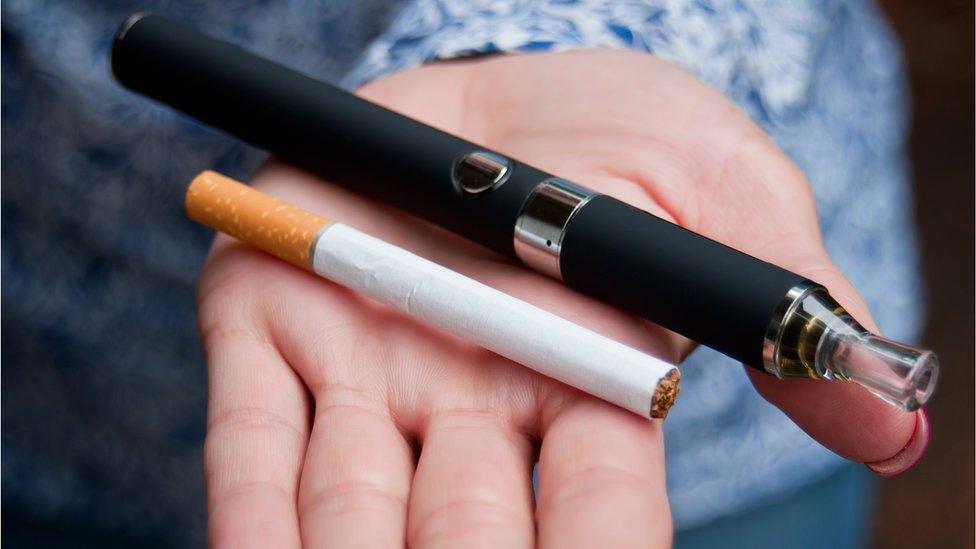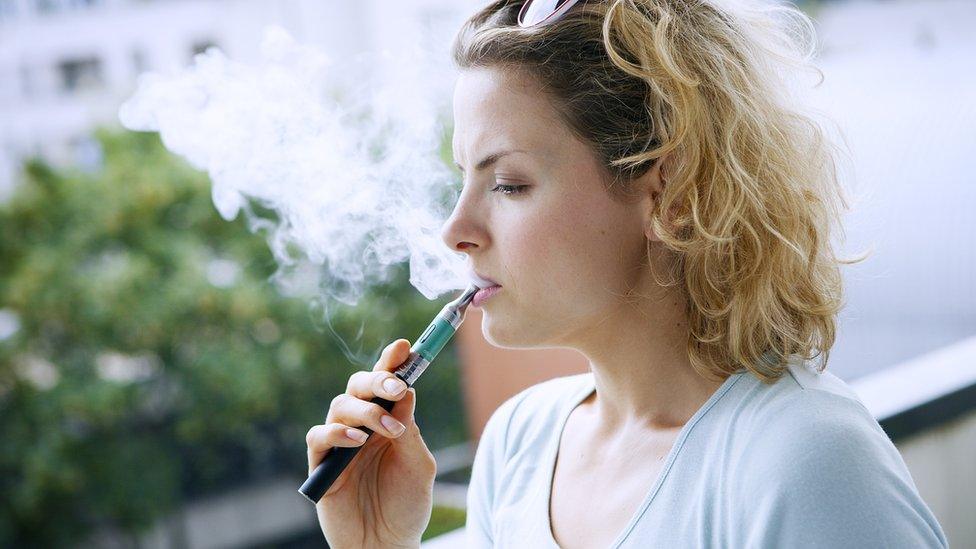How likely is your e-cigarette to explode?
- Published

There are three million e-cigarette users in the UK
A man in America died when his vape pen exploded, but how dangerous are e-cigarettes?
The case has made headlines around the world, and is believed to be the first death caused by vaping products in the US.
The man, Tallmadge D'Elia, died at his home in Florida when his device blew up and projected fragments into his skull. He was said to have suffered burns over 80% of his body.
But how common are these kinds of incidents?
In the UK, e-cigarettes have caused burns and fires, yet these cases are rare.
Experts say the man who died was using a particular kind of vape pen, known as a mechanical mod, which is not that common in the UK.
Mechanical mods do not use inner circuitry to regulate the voltage, and most e-cigarettes have more built-in safety features. Yet even these safer products can cause burns or fires if incorrectly used.
Mark Gardiner, lead officer for product safety at the Chartered Trading Standards Institute, explains: "Enthusiasts might experiment with different batteries and e-liquids to try and get the biggest vape. This can result in people building their own systems which can generate a lot of heat and then explode.
"That said, even an unmodified product can go wrong, as can any product containing a lithium-ion battery. And if a battery fails and explodes then obviously it's an extra hazard if it's in your mouth."


How to use e-cigarettes safely
Charge them only with the charger they come with
Don't leave them charging overnight
If batteries start to get hot, discard them
It's not a good idea to use them when charging
Do not modify products in any way
Do not use batteries if damaged, leaking or wet and dispose of them appropriately (via local refuse schemes)
Do not leave them plugged in once fully charged

Fire services are reporting being called out to a small number of fires caused by exploding e-cigarettes usually as a result of using the wrong charger, over-charging the battery, or incorrectly storing it.
Gary Asquith, station commander at West Yorkshire Fire & Rescue Service, says: "It's not the e-cigarettes that are unsafe in themselves, but the misuse of the lithium-ion batteries that they use."
He recalls the case of a man whose spare e-cigarette battery exploded in his pocket.
"We posted a CCTV video, external of a man in Leeds who was carrying a spare battery for his e-cigarette in his pocket. It came into contact with a coin and a key, short-circuited and exploded.
"Most people aren't aware that this might happen. You can get carry cases for your spare batteries which you should put them in if you are going to keep them in your pocket."
Mr Asquith also says he's been called out to a number of house fires caused by incorrect charging of e-cigarettes.
"If you buy an e-cigarette and it doesn't come with a charger, and then you buy a cheap one online, that is when you might see the lithium-ion battery overcharging and catching fire."

Cigarettes cause many more fires than e-cigarettes
In February, Public Health England commissioned a report into e-cigarettes and heated tobacco products. They found that there are three million users of e-cigarettes in the UK, compared with nine million cigarette smokers.
The report noted: "Exploding e-cigarettes can cause severe burns and injuries that require intensive and prolonged medical treatment, especially when they explode in users' hands, pockets or mouths.
"Incidents are very rare, the cause is uncertain but appears to be related to malfunctioning lithium-ion batteries."
You may also be interested in:
However, the authors of the report cautioned that e-cigarettes remained far safer than cigarettes which cause many more fires and injuries annually.
Health experts say e-cigarettes are at least 95% less harmful than smoking and have helped many people give up the habit.
Dr Humayun Khan, a consultant in burns and plastic surgery at Wythenshawe hospital Manchester, said incidents of burns were infrequent.
"We come across these cases about one or twice a year. They are mostly of minor injuries with small areas of burns.
"As I recall they are mostly related to leakage or overheating of the batteries rather than an explosion. We have treated these superficial burns without surgery."
Consumers who have experienced adverse effects with e-cigarettes can report these to the government's medicine watchdog, the MHRA Yellow Card Scheme, external.
- Published17 May 2018

- Published6 February 2018
